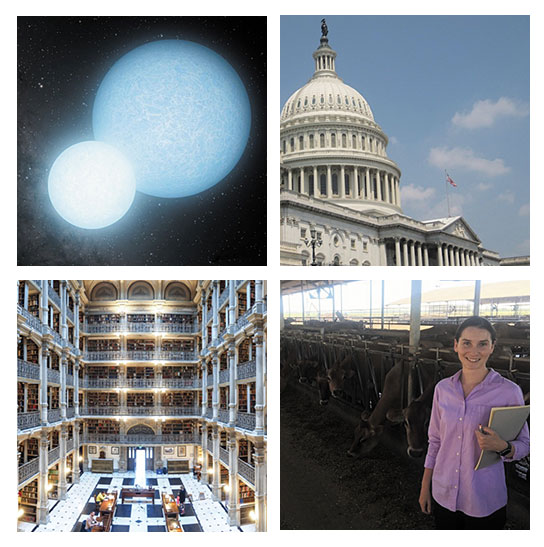Visit our website!
DOI: 10.1063/PT.3.4280
At this year’s March meeting of the American Physical Society in Boston, Physics Today conducted a series of focus groups. The goal: to find out from readers what they like and don’t like about the magazine and when and how they read it.
Most of the volunteers were graduate students and postdocs. Surprisingly perhaps, those early-career scientists overwhelmingly favor the print version of Physics Today. They read the magazine at home, on commuter trains, in bars. “It’s the only print magazine I read,” one participant told us.

Images from recent online articles. (Credits, clockwise from top left: Caltech/IPAC/R. Hurt; Toni Smith, USGS; Paul Connolly; Cynthia B. Cummings.)

I’m glad that the print issue continues to be appreciated. Although print newspapers have declined and even died as classified ads moved online to Craigslist and its ilk, magazines continue to thrive. Ads are intrusive and annoying in YouTube videos, online newspapers, and network TV shows. But in a magazine, ads can be flipped over or gazed at. Another advantage that magazines have over webpages is their superior appearance. A magazine’s fixed physical format gives art directors the freedom to fill pages with gracefully designed spreads. When designing online content, art directors have to contend with different devices and browsers. The one-size-fits-all result is less attractive.
All that being said, it frustrates me that more of Physics Today’s print readers don’t visit the magazine’s website. If they did, they’d discover compelling content that is not available in print. It’s online because it’s breaking news, because it doesn’t fit in one of the print magazine’s editorial departments, or because it features video, audio, or other media than prose and pictures. The 21 000 words of online content we posted this past July are equivalent to five feature articles in length!
What might you have missed? In May Physics Today associate editor Christine Middleton analyzed some troubling aspects of how the media portrayed the contributions of a female physicist
If you’re an experimenter, you have another reason to visit our website. In July Physics Today launched its revamped, easier-to-use Buyers’ Guide
One reason you might not be visiting our website, besides being happy with the print issue, is that it’s not a habit. The selection of websites that I routinely visit is a modest one that comprises the BBC, the Washington Post, the Guardian, Science, and Nature. Even though I’ve subscribed to the Economist since graduate school, I rarely visit its website. But don’t worry! You needn’t try to remember to visit physicstoday.org





